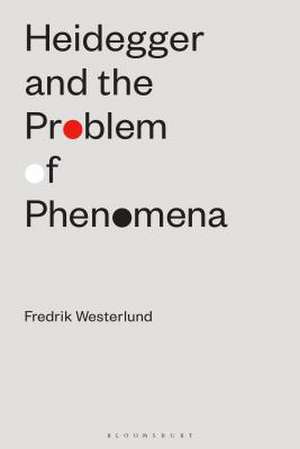Heidegger and the Problem of Phenomena
Autor Fredrik Westerlunden Limba Engleză Hardback – 19 feb 2020
| Toate formatele și edițiile | Preț | Express |
|---|---|---|
| Paperback (1) | 218.91 lei 6-8 săpt. | |
| Bloomsbury Publishing – 25 aug 2021 | 218.91 lei 6-8 săpt. | |
| Hardback (1) | 598.84 lei 6-8 săpt. | |
| Bloomsbury Publishing – 19 feb 2020 | 598.84 lei 6-8 săpt. |
Preț: 598.84 lei
Preț vechi: 858.81 lei
-30% Nou
Puncte Express: 898
Preț estimativ în valută:
114.59€ • 119.94$ • 95.37£
114.59€ • 119.94$ • 95.37£
Carte tipărită la comandă
Livrare economică 31 martie-14 aprilie
Preluare comenzi: 021 569.72.76
Specificații
ISBN-13: 9781350086470
ISBN-10: 1350086479
Pagini: 288
Dimensiuni: 156 x 234 mm
Greutate: 0.54 kg
Editura: Bloomsbury Publishing
Colecția Bloomsbury Academic
Locul publicării:London, United Kingdom
ISBN-10: 1350086479
Pagini: 288
Dimensiuni: 156 x 234 mm
Greutate: 0.54 kg
Editura: Bloomsbury Publishing
Colecția Bloomsbury Academic
Locul publicării:London, United Kingdom
Caracteristici
Contains a chapter dedicated to the philosophical significance of Heidegger's engagement in National Socialism (Nazism)
Notă biografică
Fredrik Westerlund is a senior researcher at the University of Jyväskylä, Finland, who currently works in a research project funded by the Academy of Finland. Westerlund also teaches philosophy at the University of Helsinki. His research interests include phenomenology, moral psychology, ethics, understanding and knowledge, emotions, shame, and love.
Cuprins
Acknowledgements Abbreviations: Heidegger and Husserl Introduction PART ONE: A PHENOMENOLOGY OF FACTICAL LIFE Introduction 1. Phenomenology as Primordial Science of Life 2. Heidegger's Phenomenology of Factical Life 3. Life and the Task of Philosophy PART TWO: THE HISTORICAL STRUCTURE OF PHENOMENA Introduction 4. Towards a New Conception of Phenomena 5. The Project of Fundamental Ontology 6. Being-in-the-World 7. Problems of Authenticity 8. Heidegger's Method in Being and Time PART THREE: THE OPENNESS OF BEING Introduction 9. The Question of the Openness of Being 10. The Promise of National Socialism 11. The Event that Opens the World 12. Heidegger's Late Historical Thinking EPILOGUE: BEING OPEN TOWARDS BEINGS Introduction 13. The Sources of Ethical-Existential Normativity 14. The Sources of Truth 15. Phenomenology and Historical Reflection Bibliography
Recenzii
Fredrik Westerlund's book is a breathtaking work of Heidegger-interpretation and a profoundly original argument for the irreducibility of "phenomena" - the meaningful claims that things in the world and other human beings make on us. Clearly written, the book challenges orthodoxies while providing an excellent starting point for anyone seeking philosophical and critical access to Heidegger's entire path of thinking.
Fredrik Westerlund's engaging and thought-provoking book, Heidegger and the Problem of Phenomena offers a sustained criticism of Heidegger's work from the early Freiburg lectures onwards. Although Westerlund's verdicts - for instance, on Heidegger's radical historicism and his National Socialist involvement - may sometimes seem harsh, they are always backed up by careful arguments. Moreover, the criticisms notwithstanding, Westerlund is not merely out to pinpoint Heidegger's shortcomings; he also carefully extracts the positive lessons Heidegger's philosophy has to teach us. Heidegger and the Problem of Phenomena is a most welcome addition to the literature - required reading for anyone interested in figuring out what Heidegger was wrong (and right) about.
Westerlund's book is an ambitiously comprehensive and provocative study of Heidegger's philosophy from his earliest lectures to his last writings. Westerlund brings an exceptional ethical sensitivity to bear on the fundamental tensions in Heidegger's thought: the results are far from flattering, but they deserve careful consideration from all Heidegger scholars.
Fredrik Westerlund's engaging and thought-provoking book, Heidegger and the Problem of Phenomena offers a sustained criticism of Heidegger's work from the early Freiburg lectures onwards. Although Westerlund's verdicts - for instance, on Heidegger's radical historicism and his National Socialist involvement - may sometimes seem harsh, they are always backed up by careful arguments. Moreover, the criticisms notwithstanding, Westerlund is not merely out to pinpoint Heidegger's shortcomings; he also carefully extracts the positive lessons Heidegger's philosophy has to teach us. Heidegger and the Problem of Phenomena is a most welcome addition to the literature - required reading for anyone interested in figuring out what Heidegger was wrong (and right) about.
Westerlund's book is an ambitiously comprehensive and provocative study of Heidegger's philosophy from his earliest lectures to his last writings. Westerlund brings an exceptional ethical sensitivity to bear on the fundamental tensions in Heidegger's thought: the results are far from flattering, but they deserve careful consideration from all Heidegger scholars.
